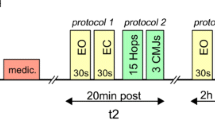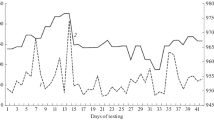Summary
The effects of transdermal scopolamine upon objective psychological performance assessments and self reports of feeling states, were investigated with volunteer subjects at sea. Scopolamine and placebo patches were administered on consecutive days in a counterbalanced order. Psychological performance was assessed 24 h following each transdermal patch. Choice reaction time and code substitution performance levels were not significantly changed, but letter cancellation errors were significantly more frequent following transdermal scopolamine. Transdermal scopolamine caused significantly more reports of dry mouth. More subjects were also unable to undertake the performance tests following scopolamine than placebo, due to difficulties in focusing on the test materials. However despite deleterious side effects with some personnel, others responded positively to the scopolamine patch. As noted by other workers, responses to the transdermal scopolamine patch seem to be quite variable.
Similar content being viewed by others
References
Ben-Barak J, Dudai Y (1980) Scopolamine induces an increase in muscarinic receptor level in rat hippocampus. Brain Res 193: 309–313
Brand JJ, Perry WLM (1966) Drugs used in motion sickness. Pharmacol Rev 18: 895–924
Chinn HI (1956) The evaluation of drugs for protection against motion sickness aboard transport ships. J Am Med Assoc 160: 755–760
Crow TJ, Grove-White IG (1973) An analysis of the learning deficit following hyoscine administration in man. Br J Psychol 49: 322–327
Elkin EH, Freedle RO, Van Cott HP, Fleishman EA (1965) Effects of drugs on human performance: the effects of scopolamine on representative human performance tests. Am Inst Res, Washington D.C.
Gart JJ (1969) An exact test for comparing matched proportions in crossover designs. Biometrika 56: 75
Glaser EM (1953) Side-effects of remedies for motion sickness. Int Rec Med Gen Pract Clin 168: 23–31
Graybiel A, Cramer DB, Wood CD (1982) Antimotion-sickness efficacy of scopolamine 12 and 72 hours after transdermal administration. Aviat Space Environ Med 53: 770–772
Graybiel A, Knepton J, Shaw J (1976) Prevention of experimental motion sickness by scopolamine absorbed through the skin. Aviat Space Environ Med 47: 1096–1100
Homick JL, Lee Kohl R, Reschke MF, Degionanni J, Cintron-Trevino NM (1983) Transdermal scopolamine in the prevention of motion sickness: evaluation of the time course of efficacy. Aviat Space Environ Med 54: 994–1000
Hordinsky JR, Beier J, Schwartz E, Martin J, Aust G (1982) Relative efficacy of the proposed space shuttle antimotion sickness medications. Acta Astronautica 9: 375–383
Parrott AC (1984) Effects of oral and transdermal scopolamine upon psychological assessments. INM: 13/84. Institute of Naval Medicine Report, Gosport, U.K.
Parrott AC, Hindmarch I, Stonier PD (1982) Nomifensine clobazam and HOE 8476: effects on aspects of psychomotor performance and cognitive ability. Eur J Clin Pharmacol 23: 309–313
Price NM, Schmitt LG, McGuire J, Shaw JE, Trobough G (1981) Transdermal delivery of scopolamine for prevention ot motion-induced nausea at sea. Clin Pharmacol Therap 29: 414–420
Reason JT, Brand JJ (1975) Motion sickness. Academic, London
Sitaram N, Moore AM, Gillin JC (1979) Scopolamine induced muscarinic supersensitivity in normal man: changes in sleep. Psychiatr Res 1: 9–16
Wesnes K, Warburton DM (1983) Effects of scopolamine on stimulus sensitivity and response bias in a visual vigilance task. Neuropsychobiology 9: 154–157
Author information
Authors and Affiliations
Additional information
Dr. A. C. Parrott is Senior Psychologist at the Institute of Naval Medicine.
Surgeon Lt. R. Jones RN, was Medical Officer to HMS Hydra
Rights and permissions
About this article
Cite this article
Parrott, A.C., Jones, R. Effects of transdermal scopolamine upon psychological test performance at sea. Eur J Clin Pharmacol 28, 419–423 (1985). https://doi.org/10.1007/BF00544360
Received:
Accepted:
Issue Date:
DOI: https://doi.org/10.1007/BF00544360




